

273 Strong Verbs That’ll Spice Up Your Writing
Do you ever wonder why a grammatically correct sentence you’ve written just lies there like a dead fish?
I sure have.
Your sentence might even be full of those adjectives and adverbs your teachers and loved ones so admired in your writing when you were a kid.
But still the sentence doesn’t work.
Something simple I learned from The Elements of Style years ago changed the way I write and added verve to my prose. The authors of that little bible of style said: “Write with nouns and verbs, not with adjectives and adverbs.”
Even Mark Twain was quoted , regarding adjectives: “When in doubt, strike it out.”
That’s not to say there’s no place for adjectives. I used three in the title and first paragraph of this post alone.
The point is that good writing is more about well-chosen nouns and powerful verbs than it is about adjectives and adverbs, regardless what you were told as a kid.
There’s no quicker win for you and your manuscript than ferreting out and eliminating flabby verbs and replacing them with vibrant ones.
*Ready to take the next step as a writer? Grab Self-Editing Masterclass , a power-packed collection of video lessons and resources that gives you all the tools you’ll need to write crystal-clear prose you’ll be confident to show agents and publishers. Best of all? You can get through all the material in under two hours.*
- How To Know Which Verbs Need Replacing
Your first hint is your own discomfort with a sentence. Odds are it features a snooze-inducing verb.
As you hone your ferocious self-editing skills, train yourself to exploit opportunities to replace a weak verb for a strong one .
At the end of this post I suggest a list of 273 vivid verbs you can experiment with to replace tired ones.
What constitutes a tired verb? Here’s what to look for:
- 3 Types of Verbs to Beware of in Your Prose
1. State-of-being verbs
These are passive as opposed to powerful:
Am I saying these should never appear in your writing? Of course not. You’ll find them in this piece. But when a sentence lies limp, you can bet it contains at least one of these. Determining when a state-of-being verb is the culprit creates a problem—and finding a better, more powerful verb to replace it— is what makes us writers. [Note how I replaced the state-of-being verbs in this paragraph.]
Resist the urge to consult a thesaurus for the most exotic verb you can find. I consult such references only for the normal word that carries power but refuses to come to mind.
I would suggest even that you consult my list of powerful verbs only after you have exhaust ed all efforts to come up with one on your own. You want Make your prose to be your own creation, not yours plus Roget or Webster or Jenkins. [See how easy they are to spot and fix?]
Impotent: The man was walking on the platform.
Powerful: The man strode along the platform.
Impotent: Jim is a lover of country living.
Powerful: Jim treasures country living.
Impotent: There are three things that make me feel the way I do…
Powerful: Three things convince me…
2. Verbs that rely on adverbs
Powerful verbs are strong enough to stand alone.
The fox ran quickly dashed through the forest.
She menacingly looked glared at her rival.
He secretly listened eavesdropped while they discussed their plans.
3. Verbs with -ing suffixes
Before: He was walking…
After: He walked…
Before: She was loving the idea of…
After: She loved the idea of…
Before: The family was starting to gather…
After: The family started to gather…

- The Strong Verbs List
- Disillusion
- Reverberate
- Revolutionize
- Supercharge
- Transfigure

Faith-Based Words and Phrases

What You and I Can Learn From Patricia Raybon

A Guest Blog from Stephen King—Yes, that Stephen King

Before you go, be sure to grab my FREE guide:
How to Write a Book: Everything You Need to Know in 20 Steps
Just tell me where to send it:

Great!
Where should i send your free pdf.
Power Verbs for Essays (With Examples)
By The ProWritingAid Team
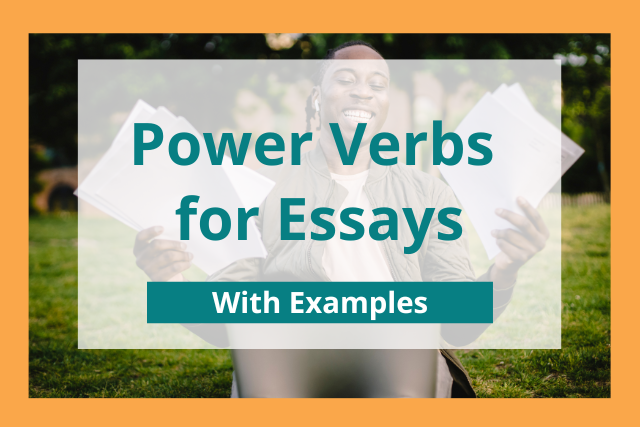
Adding power verbs to your academic paper will improve your reader’s experience and bring more impact to the arguments you make.
While the arguments themselves are the most important elements of any successful academic paper, the structure of those arguments and the language that is used influence how the paper is received.
Academic papers have strict formal rules, but as long as these are followed, there is still plenty of scope to make the key points of the paper stand out through effective use of language and more specifically, the effective use of power verbs.
Power verbs are verbs that indicate action and have a more positive and confident tone. Using them brings strength and confidence to the arguments you are making, while also bringing variation to your sentences and making your writing more interesting to the reader.
The best academic papers will use such verbs to support their arguments or concepts, so it is important that your paper contains at least three power verbs.
ProWritingAid will check your writing for power verbs and will notify you if you have less than three throughout your whole academic paper.
Power Verbs Boost Ideas
Examples of power verbs.
Academic papers of all disciplines are often filled with overlong and complicated sentences that are attempting to convey specific ideas and concepts. Active and powerful verbs are useful both to the reader and the author of the paper.
For the reader who is trying to tackle these ideas and concepts, the power verbs provide clarity and purpose. Compare the following sentences:
- This paper will say that there were two reasons for the start of the civil war.
- This paper asserts that there were two reasons for the start of the civil war.
Clearly the second sentence is more confident, direct, and authoritative because it has replaced the dull ‘says’ with ‘asserts.’ For the writer, the power verb expresses confidence in the idea being presented.
The following are examples of power verbs that are useful in academic writing, both for supporting an argument and for allowing you to vary the language you use.
Power Verbs for Analysis: appraise, define, diagnose, examine, explore, identify, interpret, investigate, observe.
Power Verbs to Introduce a Topic: investigate, outline, survey, question, feature.
Power Verbs to Agree with Existing Studies: indicate, suggest, confirm, corroborate, underline, identify, impart, maintain, substantiate, support, validate, acknowledge, affirm, assert.
Power Verbs to Disagree with Existing Studies: reject, disprove, debunk, question, challenge, invalidate, refute, deny, dismiss, disregard, object to, oppose.
Power Verbs to Infer: extract, approximate, surmise, deduce.
Power Verbs for Cause and Effect : impacts, compels, generates, incites, influences, initiates, prompts, stimulates, provokes, launches, introduces, advances.
Legal Power Verbs: sanctions, consents, endorses, disallows, outlaws, prohibits, precludes, protects, bans, licenses, authorizes.
Power Verbs that Say: convey, comment, state, establish, elaborate, identify, propose.
Power Verbs that Show: reveal, display, highlight, depict, portray, illustrate.

Be confident about grammar
Check every email, essay, or story for grammar mistakes. Fix them before you press send.
The ProWritingAid Team
The most successful people in the world have coaches. Whatever your level of writing, ProWritingAid will help you achieve new heights. Exceptional writing depends on much more than just correct grammar. You need an editing tool that also highlights style issues and compares your writing to the best writers in your genre. ProWritingAid helps you find the best way to express your ideas.
Get started with ProWritingAid
Drop us a line or let's stay in touch via:

50 Verbs of Analysis for English Academic Essays

Note: this list is for advanced English learners (CEFR level B2 or above). All definitions are from the Cambridge Dictionary online .
Definition: to have an influence on someone or something, or to cause a change in someone or something.
Example: Experts agree that coffee affects the body in ways we have not yet studied.
Definition: to increase the size or effect of something.
Example: It has been shown that this drug amplifies the side effects that were experienced by patients in previous trials.
Definition: to say that something is certainly true .
Example: Smith asserts that his findings are valid, despite criticism by colleagues.
Characterizes
Definition: Something that characterizes another thing is typical of it.
Example: His early paintings are characterized by a distinctive pattern of blue and yellow.
Definition: to say that something is true or is a fact , although you cannot prove it and other people might not believe it.
Example: Smith claims that the study is the first of its kind, and very different from the 2015 study he conducted.
Definition: to make something clear or easier to understand by giving more details or a simpler explanation .
Example: The professor clarified her statement with a later, more detailed, statement.
Definition: t o collect information from different places and arrange it in a book , report , or list .
Example: After compiling the data, the scientists authored a ten-page paper on their study and its findings.
Definition: to judge or decide something after thinking carefully about it.
Example: Doctor Jensen concluded that the drug wasn’t working, so he switched his patient to a new medicine.
Definition: to prove that a belief or an opinion that was previously not completely certain is true .
Example: This new data confirms the hypothesis many researchers had.
Definition: to join or be joined with something else .
Example: By including the criticisms of two researchers, Smith connects two seemingly different theories and illustrates a trend with writers of the Romanticism period.

Differentiates
Definition: to show or find the difference between things that are compared .
Example: Smith differentiates between the two theories in paragraph 4 of the second part of the study.
Definition: to reduce or be reduced in s i ze or importance .
Example: The new findings do not diminish the findings of previous research; rather, it builds on it to present a more complicated theory about the effects of global warming.
Definition: to cause people to stop respecting someone or believing in an idea or person .
Example: The details about the improper research done by the institution discredits the institution’s newest research.
Definition: to show.
Example: Smith’s findings display the effects of global warming that have not yet been considered by other scientists.
Definition: to prove that something is not true .
Example: Scientists hope that this new research will disprove the myth that vaccines are harmful to children.
Distinguishes
Definition: to notice or understand the difference between two things, or to make one person or thing seem different from another.
Example: Our study seems similar to another one by Duke University: how can we distinguish ourselves and our research from this study?
Definition: to add more information to or explain something that you have said.
Example: In this new paper, Smith elaborates on theories she discussed in her 2012 book.
Definition: to represent a quality or an idea exactly .
Example: Shakespeare embodies English theater, but few can understand the antiquated (old) form of English that is used in the plays.
Definition: to copy something achieved by someone else and try to do it as well as they have.
Example: Although the study emulates some of the scientific methods used in previous research, it also offers some inventive new research methods.
Definition: to improve the quality , amount , or strength of something.
Example: The pharmaceutical company is looking for ways to enhance the effectiveness of its current drug for depression.

Definition: to make something necessary , or to involve something.
Example: The scientist’s study entails several different stages, which are detailed in the report.
Definition: to consider one thing to be the same as or equal to another thing.
Example: Findings from both studies equate; therefore, we can conclude that they are both accurate.
Establishes
Definition: to discover or get proof of something.
Example: The award establishes the main causes of global warming.
Definition: to make someone remember something or feel an emotion .
Example: The artist’s painting evokes the work of some of the painters from the early 1800s.
Definition: to show something.
Example: Some of the research study participants exhibit similar symptoms while taking the medicine.
Facilitates
Definition: to make something possible or easier .
Example: The equipment that facilitates the study is expensive and of high-quality.
Definition: the main or central point of something, especially of attention or interest .
Example: The author focuses on World War II, which is an era she hasn’t written about before.
Foreshadows
Definition: to act as a warning or sign of a future event .
Example: The sick bird at the beginning of the novel foreshadows the illness the main character develops later in the book.
Definition: to develop all the details of a plan for doing something.
Example: Two teams of scientists formulated the research methods for the study.
Definition: to cause something to exist .
Example: The study’s findings have generated many questions about this new species of frog in South America.

Definition: to attract attention to or emphasize something important .
Example: The author, Dr. Smith, highlights the need for further studies on the possible causes of cancer among farm workers.
Definition: to recognize a problem , need, fact , etc. and to show that it exists .
Example: Through this study, scientists were able to identify three of the main factors causing global warming.

Illustrates
Definition: to show the meaning or truth of something more clearly , especially by giving examples .
Example: Dr. Robin’s study illustrates the need for more research on the effects of this experimental drug.
Definition: to communicate an idea or feeling without saying it directly .
Example: The study implies that there are many outside factors (other than diet and exercise) which determine a person’s tendency to gain weight.
Incorporates
Definition: to include something as part of something larger .
Example: Dr. Smith incorporates research findings from 15 other studies in her well-researched paper.
Definition: to show, point , or make clear in another way.
Example: Overall, the study indicates that there is no real danger (other than a lack of sleep) to drinking three cups of coffee per day.
Definition: to form an opinion or guess that something is true because of the information that you have.
Example: From this study about a new medicine, we can infer that it will work similarly to other drugs that are currently being sold.
Definition: to tell someone about parti c ular facts .
Example: Dr. Smith informs the reader that there are some issues with this study: the oddly rainy weather in 2017 made it difficult for them to record the movements of the birds they were studying.
Definition: to suggest , without being direct , that something unpleasant is true .
Example: In addition to the reported conclusions, the study insinuates that there are many hidden dangers to driving while texting.
Definition: to combine two or more things in order to become more effective .
Example: The study about the popularity of social media integrates Facebook and Instagram hashtag use.

Definition: to not have or not have enough of something that is needed or wanted .
Example: What the study lacks, I believe, is a clear outline of the future research that is needed.
Legitimizes
Definition: to make something legal or acceptable .
Example: Although the study legitimizes the existence of global warming, some will continue to think it is a hoax.
Definition: to make a problem bigger or more important .
Example: In conclusion, the scientists determined that the new pharmaceutical actually magnifies some of the symptoms of anxiety.
Definition: something that a copy can be based on because it is an extremely good example of its type .
Example: The study models a similar one from 1973, which needed to be redone with modern equipment.
Definition: to cause something to have no effect .
Example: This negates previous findings that say that sulphur in wine gives people headaches.
Definition: to not give enough c a re or attention to people or things that are your responsibility .
Example: The study neglects to mention another study in 2015 that had very different findings.
Definition: to make something difficult to discover and understand .
Example: The problems with the equipment obscures the study.
Definition: a description of the main facts about something.
Example: Before describing the research methods, the researchers outline the need for a study on the effects of anti-anxiety medication on children.
Definition: to fail to notice or consider something or someone.
Example: I personally feel that the study overlooks something very important: the participants might have answered some of the questions incorrectly.
Definition: to happen at the same time as something else , or be similar or equal to something else .
Example: Although the study parallels the procedures of a 2010 study, it has very different findings.
Converse International School of Languages offers an English for Academic Purposes course for students interested in improving their academic English skills. Students may take this course, which is offered in the afternoon for 12 weeks, at both CISL San Diego and CISL San Francisco . EAP course graduates can go on to CISL’s Aca demic Year Abroad program, where students attend one semester at a California Community College. Through CISL’s University Pathway program, EAP graduates may also attend college or university at one of CISL’s Pathway Partners. See the list of 25+ partners on the CISL website . Contact CISL for more information.
280+ Strong Verbs: 3 Tips to Strengthen Your Verbs in Writing
by Joe Bunting | 0 comments
Strong verbs transform your writing from drab, monotonous, unclear, and amateurish to engaging, professional, and emotionally powerful.
Which is all to say, if you're not using strong verbs in your writing, you're missing one of the most important stylistic techniques.
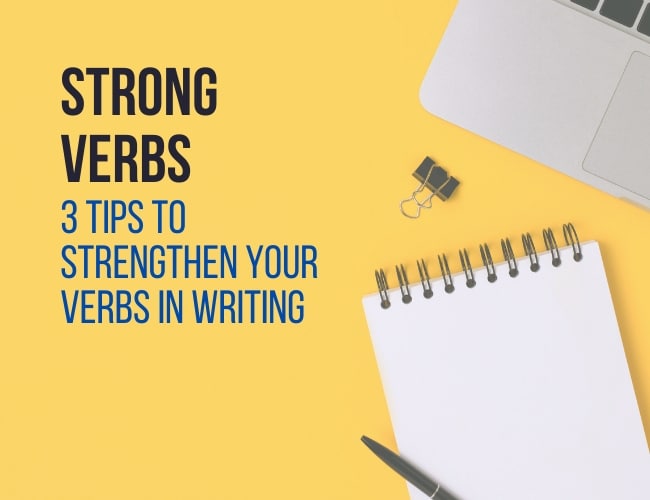
Why listen to Joe? I've been a professional writer for more than a decade, writing in various different formats and styles. I've written formal nonfiction books, descriptive novels, humorous memoir chapters, and conversational but informative online articles (like this one!).
In short, I earn a living in part by writing (and revising) using strong verbs selected for each type of writing I work on. I hope you find the tips on verbs below useful! And if you want to skip straight to the verb list below, click here to see over 200 strong verbs.
Hemingway clung to a writing rule that said, “Use vigorous English.” In fact, Hemingway was more likely to use verbs than any other part of speech, far more than typical writing.
But what are strong verbs? And how do you avoid weak ones?
In this post, you'll learn the three best techniques to find weak verbs in your writing and replace them with strong ones. We'll also look at a list of the strongest verbs for each type of writing, including the strongest verbs to use.
What are Strong Verbs?
Strong verbs, in a stylistic sense, are powerful verbs that are specific and vivid verbs. They are most often in active voice and communicate action precisely.
The Top 7 Strong Verbs
Here are the top 7 I found when I reviewed a couple of my favorite books. See if you agree and tell me in the comments.
Think about the vivid and specific image each of these strong verbs conjures. Each one asserts precision.
It's true that writers will use descriptive verbs that best fit their character, story, and style, but it's interesting to note trends.
For example, Hemingway most often used verbs like: galloped, punched, lashed, and baited. Each of these verbs evokes a specific motion, as well as a tone. Consider how Hemingway's verbs stack up against weaker counterparts:
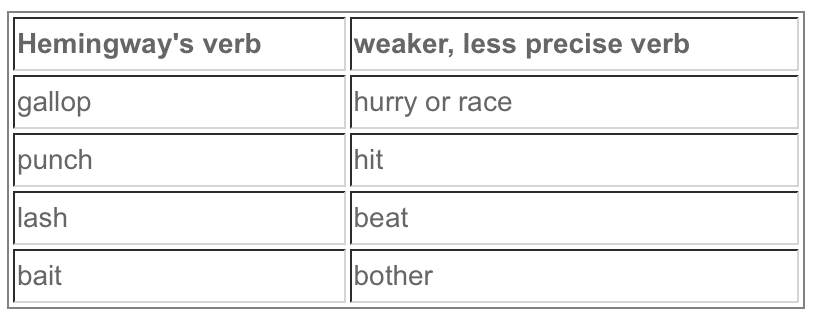
None of the weaker verbs are incorrect, but they don't pack the power of Hemingway's strong action verbs, especially for his story lines, characters, and style. These are verbs that are forward-moving and aggressive in tone. (Like his characters!)
Consider how those choices differ significantly than a few from Virginia Woolf's opening page of Mrs. Dalloway :
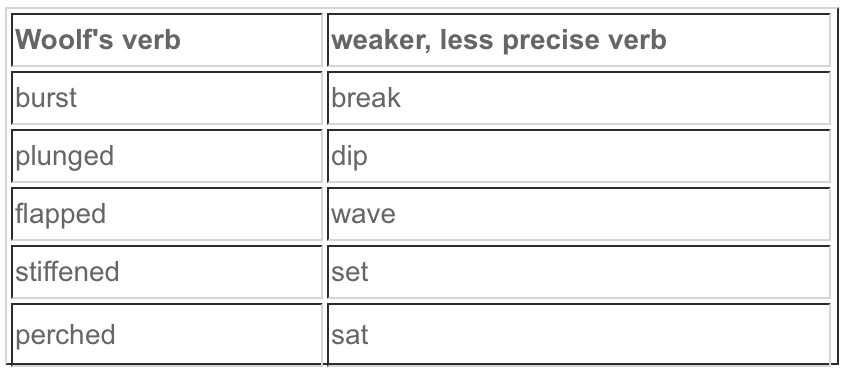
Notice how Woolf's choices create the vibrant, descriptive style that marks her experimental novel and its main character. Consider the difference between “perched” and “sat.” “Perched” suggests an image of a bird, balancing on a wire. Applied to people, it connotes an anxiousness or readiness to stand again. “Sat” is much less specific.
The strongest verbs for your own writing will depend on a few things: your story, the main character, the genre, and the style that is uniquely yours. How do you choose then? Let's look at three tips to edit out weak, boring verbs.
How to Edit for Strong Verbs FAST
So how do you root out those weak verbs and revise them quickly? Here are a few tips.
1. Search for Weak Verbs
All verbs can be strong if they're used in specific, detailed, and descriptive sentences.
The issue comes when verbs are overused, doing more work than they're intended for, watering down the writing.
Here are some verbs that tend to weaken your writing:
Did you notice that most of these are “to be” verbs? That's because “to be” verbs are linking verbs or state of being verbs. Their purpose is to describe conditions.
For example, in the sentence “They are happy,” the verb “are” is used to describe the state of the subject.
There's nothing particularly wrong with linking verbs. Writers who have a reputation for strong writing, like Ernest Hemingway or Cormac McCarthy, use linking verbs constantly.
The problem comes when you overuse them. Linking verbs tend to involve more telling vs. showing .
Strong verbs, on the other hand, are usually action verbs, like whack, said, ran, lassoed, and spit (see more in the list below).
The most important thing is to use the best verb for the context, while emphasizing specific, important details.
Take a look at the following example early into Hemingway's For Whom the Bell Tolls :
The young man, who was studying the country, took his glasses from the pocket of his faded, khaki flannel shirt, wiped the lenses with a handkerchief, screwed the eyepieces around until the boards of the mill showed suddenly clearly and he saw the wooden bench beside the door; the huge pile of sawdust that rose behind the open shed where the circular saw was , and a stretch of the flume that brought the logs down from the mountainside on the other bank of the stream.
I've highlighted all the verbs. You can see here that Hemingway does use the word “was,” but most of the verbs are action verbs, wiped, took, screwed, saw, etc. The result of this single sentence is that the audience pictures the scene with perfect clarity.
Here's another example from Naomi Novick's Deadly Education:
He was only a few steps from my desk chair, still hunched panting over the bubbling purplish smear of the soul-eater that was now steadily oozing into the narrow cracks between the floor tiles, the better to spread all over my room. The fading incandescence on his hands was illuminating his face, not an extraordinary face or anything: he had a big beaky nose that would maybe be dramatic one day when the rest of his face caught up, but for now was just too large, and his forehead was dripping sweat and plastered with his silver-grey hair that he hadn’t cut for three weeks too long.
Vivid right? You can see that again, she incorporates weaker verbs (was, had) into her writing, but the majority are highly descriptive action verbs like hunched, illuminating, spread, plastered, and dripping.
Don't be afraid of linking verbs, state verbs, or helping verbs, but emphasize action words to make your writing more powerful.
2. Remove Adverbs and Replace the Verbs to Make Them Stronger
Adverbs add more detail and qualifications to verbs or adjectives. You can spot them because they usually end in “-ly,” like the word “usually” in this sentence, or frequently, readily, happily, etc.
Adverbs get a bad rap from writers.
“I believe the road to hell is paved with adverbs,” Stephen King said.
“Adverbs are dead to me. They cannot excite me,” said Mark Twain .
“I was taught to distrust adjectives,” said Hemingway, “as I would later learn to distrust certain people in certain situations.”
Even Voltaire jumped in on the adverb dogpile, saying, “Adjectives are frequently the greatest enemy of the substantive.”
All of these writers, though, used adverbs when necessary. Still, the average writer uses them far more than they did.
Adverbs signal weak verbs. After all, why use two words, an adverb and a verb, when one strong verb can do.
Look at the following examples of adverbs with weak verbs replaced by stronger verbs:
- He ran quickly –> He sprinted
- She said loudly –> She shouted
- He ate hungrily –> He devoured his meal
- They talked quietly –> They whispered
Strive for simple, strong, clear language over padding your writing with more words.
You don't need to completely remove adverbs from your writing. Hemingway himself used them frequently. But cultivating a healthy distrust of adverbs seems to be a sign of wisdom among writers.
3. Stop Hedging and “Eliminate Weasel Words”
Amazon's third tip for writing for employees is “Eliminate Weasel Words,” and that advice applies to verbs too.
Instead of “nearly all customers,” say, “89 percent of customers.”
Instead of “significantly better,” say, “a 43 percent improvement.”
Weasel words are a form of hedging.
Hedging allows you to avoid commitment by using qualifiers such as “probably,” “maybe,” “sometimes,” “often,” “nearly always,” “I think,” “It seems,” and so on.
Hedge words or phrases soften the impact of a statement or to reduce the level of commitment to the statement's accuracy.
By eliminating hedging, you're forced to strengthen all your language, including verbs.
What do you really think about something? Don't say, “I think.” Stand by it. A thing is or isn't. You don't think it is or believe it is. You stand by it.
If you write courageously with strength of opinion, your verbs grow stronger as well.
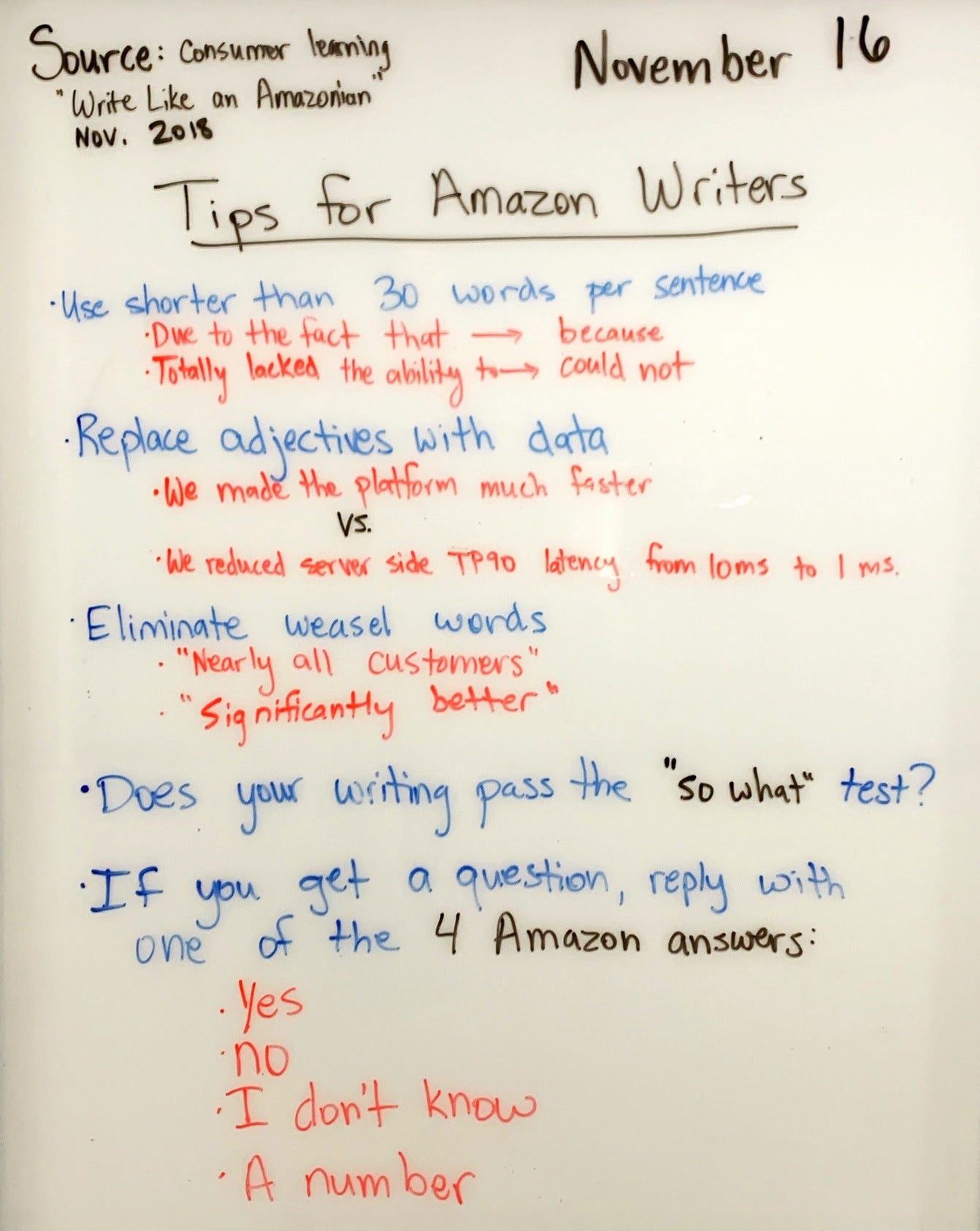
Beware the Thesaurus: Strong Verbs are Simple Verbs
I caveat this advice with the advice to beware thesauruses.
Strong writing is almost always simple writing. Compelling action verbs don't have to be obscure–they are precise.
Writers who replace verbs like “was” and “get” with long, five-syllable verbs that mean the same thing as a simple, one-syllable verb don't actually communicate more clearly.
To prepare for this article, I studied the verb use in the first chapters of several books by my favorite authors, including Ernest Hemingway's For Whom the Bell Tolls and Naomi Novik's Deadly Education.
Hemingway has a bigger reputation as a stylist and a “great” writer, but I found that Novik's verb choice was just as strong and even slightly more varied.
Hemingway tended to use simpler, shorter verbs, though, often repeating verbs, whereas Novik's verbs were longer and often more varied.
I love both of these writers, but if you're measuring strength, simplicity will most often win.
In dialogue this is especially important . Writers sometimes try to find every synonym for the word, “said” to describe the exact timber and attitude of how a character is speaking.
This becomes a distraction from the dialogue itself. In dialogue, the words spoken should speak for themselves, not whatever synonym the writer has looked up for “said.”
Writers should use simple speaker tags like “said” and “asked” as a rule, only varying that occasionally when the situation warrants it.
270+ Strong Verbs List
We've argued strong verbs are detailed, descriptive, action verbs, and below, I list over 200 strong verbs to make your writing better.
I compiled this list directly from the first chapters of some of my favorite books, already mentioned previously, For Whom the Bell Tolls by Ernest Hemingway, Deadly Education by Naomi Novik, and The Undoing Project by Michael Lewis.
This is a necessarily simplified list, taken only from the first chapters of those books. There are thousands of strong verbs, usually action verbs, but these are a good start.
I've also sorted them alphabetically and put them into present tense.
- Collaborate
- Intellectualize
The Best Way to Learn to Use Strong Verbs
The above tips will help get you started using strong verbs, but the best way to learn how to grow as a writer with your verbs is through reading.
But not just reading, studying the work of your favorite writers carefully and then trying to emulate it, especially in the genre you write in.
As Cormac McCarthy, who passed away recently, said, “The unfortunate truth is that books are made from books.”
If you want to grow as a writer, start with the books you love. Then adapt your style from there.
Which tip will help you use more strong verbs in your writing today? Let me know in the comments.
Choose one of the following three practice exercises:
1. Study the verb use in the first chapter of one of your favorite books. Write down all of the verbs the author uses. Roughly what percentage are action verbs versus linking verbs? What else do you notice about their verb choice?
2. Free write for fifteen minutes using only action verbs and avoiding all “to be” verbs and adverbs.
3. Edit a piece that you've written, replacing the majority of linking verbs with action verbs and adverbs with stronger verbs.
Share your practice in the Pro Practice Workshop here , and give feedback to a few other writers.
Joe Bunting
Joe Bunting is an author and the leader of The Write Practice community. He is also the author of the new book Crowdsourcing Paris , a real life adventure story set in France. It was a #1 New Release on Amazon. Follow him on Instagram (@jhbunting).
Want best-seller coaching? Book Joe here.
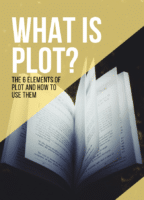
Work with Joe Bunting?
WSJ Bestselling author, founder of The Write Practice, and book coach with 14+ years experience. Joe Bunting specializes in working with Action, Adventure, Fantasy, Historical Fiction, How To, Literary Fiction, Memoir, Mystery, Nonfiction, Science Fiction, and Self Help books. Sound like a good fit for you?
Submit a Comment Cancel reply
Your email address will not be published. Required fields are marked *
Submit Comment
Join over 450,000 readers who are saying YES to practice. You’ll also get a free copy of our eBook 14 Prompts :
Popular Resources
Best Resources for Writers Book Writing Tips & Guides Creativity & Inspiration Tips Writing Prompts Grammar & Vocab Resources Best Book Writing Software ProWritingAid Review Writing Teacher Resources Publisher Rocket Review Scrivener Review Gifts for Writers
Books By Our Writers

You've got it! Just us where to send your guide.
Enter your email to get our free 10-step guide to becoming a writer.
You've got it! Just us where to send your book.
Enter your first name and email to get our free book, 14 Prompts.
Want to Get Published?
Enter your email to get our free interactive checklist to writing and publishing a book.

IMAGES
VIDEO
COMMENTS
The point is that good writing is more about well-chosen nouns and powerful verbs than it is about adjectives and adverbs, regardless what you were told as a kid. There’s no quicker win for you and your manuscript than ferreting out and eliminating flabby verbs and replacing them with vibrant ones.
The following are examples of power verbs that are useful in academic writing, both for supporting an argument and for allowing you to vary the language you use. Power Verbs for Analysis: appraise, define, diagnose, examine, explore, identify, interpret, investigate, observe.
Each word has specific usage patterns that are unique to its meaning. Literary Essay. Report or Persuasive Essay that refers to an expert’s opinion or research studies. Report or Persuasive Essay that describes beginnings, causes, effects, etc.
Improve your essays with these 50 useful verbs for analysis. This list is great for English learners and college students!
Strong verbs transform your writing from unclear and amateurish to engaging and emotionally powerful. Here's a list of over 280 strong verbs.
A strong verb is a better and more descriptive version of a word that depicts the way the verb is performed, making it specific and sharper for the scene you’re writing. Thanks to every English class growing up, you know a verb is a word used to describe an action, state, or occurrence.